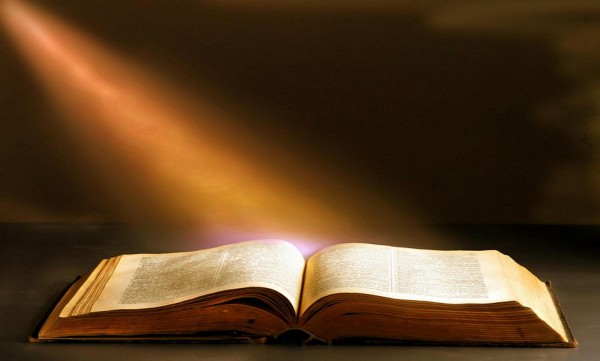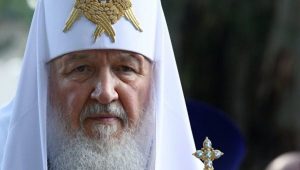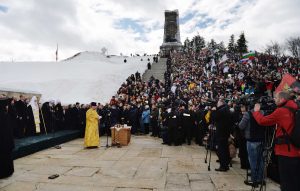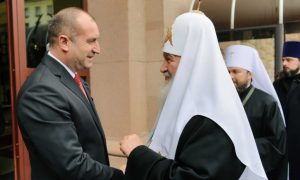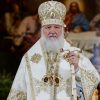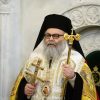God Himself bore witness to people about Himself, and this witness is contained in the Bible. The Biblical texts contain statements, various definitions, expressions, and phrases that help one to understand what God has told people about Himself.
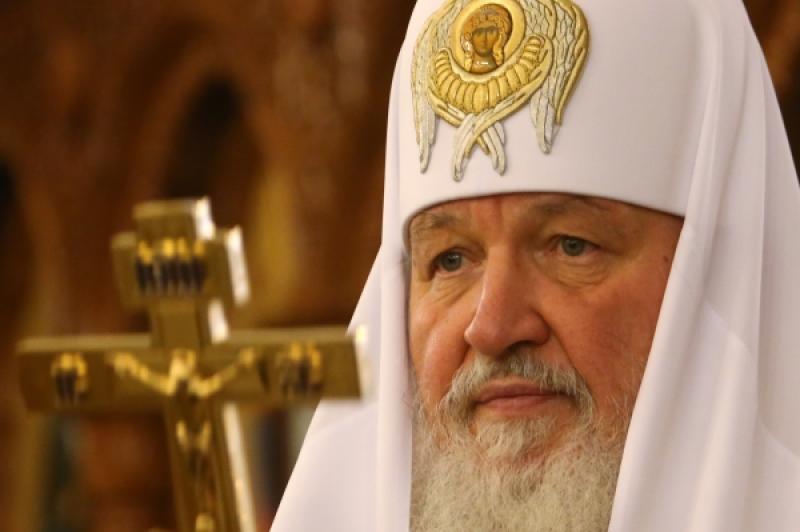 In the Prophet Hosea, we find this definition of God: “I am God, and not man.” If God, Who has reason and will, as is clearly reflected in the Bible (3 Kings [1 Kings] 3:28; Job 12:13, 16; Proverbs 3:19-20; Sirach 1:1, 5; 15:18, 42:21; Esaias [Isaiah] 11:2; 28:29; Luke 11:49; Romans 11:33; 14:26; 1 Corinthians 1: 21, 24; 2:7. Will of God: Psalm 106 [107]: 11; Wisdom 6:4; Mark 3:35; Luke 7:30; Acts 20:27; 1 Peter 2:15; 3:17; 4:2, 19; 1 John 2:17; Romans 1:10; 8:27; 12:2; 1 Corinthians 1:1; 2 Corinthians 8:5; Ephesians 5:17; 6:6; 1 Thessalonians 4:3; 5:18; Hebrews 10:36; Revelation 17:17), is not man, this means that He is a being of another order, located by His nature beyond our world. He, as philosophers and theologians say, is transcendent with respect to the world. This transcendence – that is, God’s natural distinction from the physical world – is described in the Bible by the word “Spirit.” “God is a spirit” (John 4:24. Cf., Genesis 1:2; 6:3; 41:38; Exodus 15:10; 31:3. Numbers 11:29; 23:6; 24:2; Judges 3:10; 6:34; 11:29; 13:25; 14:6, 19; 15:14; 1 Kings [1 Samuel] 10:6, 10; 11:6; 16:13; 19:20, 23; 2 Kings [2 Samuel] 23:2; 3 Kings [1 Kings] 18:12; 1 Paralipomena [1 Chronicles] 15:1; 2 Paralipomena [2 Chronicles] 15:1; 20: 14; 24:20; Neemias [Nehemiah] 9:20; Judith 16:14; Job 4:9; 26: 13; 33:4; Psalms 32 [33]:6; 50 [51]:13; 103 [104]:30; 138 [139]:7; 142 [143]:10; Wisdom of Solomon 1:7; 9:17; 12:1; Esaias [Isaiah] 11:2; 32:15; 34:16; 42:1; 44:3; 48:16; 61:1; 63:10–14. Ezekiel 11:1, 5; Aggeus [Haggai] 2:5; Zacharias 4:6; 7:12; 2 Esdras 6:37; Matthew 1:20; 3:16; 4:1; 10:20; 12:31–32; 28:19. Mark 1:10, 12; 3:29; 13:11; Luke 1:35, 67; 2:26; 3:22; 4:1, 18; 11:13; 12:10, 12; John 1:32–33; 3:5–6, 8, 34; 6:63; 7:39; 14:17, 26; 15:26; 16:13; 20:22; Acts 1:2, 5, 8, 16; 2:4, 17–18, 33, 38; 5:3, 9; 7:51; 8:29; 9:31; 10:19; 11:12, 28; 13:2, 4; 15:28; 16:6–7; 19:6; 20:22–23, 28; 21:11; 28:25. 1 Peter 1:2, 11–12, 22; 5:5; 8:9, 11, 14–16, 23, 26–27; 11:8; 14:17; 15:13, 16, 19, 30; 1 Corinthians 2:10–14; 3:16; 6:11, 19; 12: 3–4, 8–11, 13; 15:45; 2 Corinthians 1:22; 3:3, 17–18; 5:5; Galatians 3:5, 14; 4: 6; Ephesians 1:13, 17; 2:18. 22; 3:5, 16; 4:30; 5:9; Philippians 1:19; 1 Thessalonians 1:5–6; 4:8; 2 Thessalonians 2:8, 13; 1 Timothy 3:16; 4:1; 2 Тimothy 1:14; Titus 3:5; Hebrews 2:4; 3:7; 6:4; 9:8, 14; 10:15, 29; Revelation 2:7, 11, 17, 29; 3:6, 13, 22; 14:13; 22:17).
In the Prophet Hosea, we find this definition of God: “I am God, and not man.” If God, Who has reason and will, as is clearly reflected in the Bible (3 Kings [1 Kings] 3:28; Job 12:13, 16; Proverbs 3:19-20; Sirach 1:1, 5; 15:18, 42:21; Esaias [Isaiah] 11:2; 28:29; Luke 11:49; Romans 11:33; 14:26; 1 Corinthians 1: 21, 24; 2:7. Will of God: Psalm 106 [107]: 11; Wisdom 6:4; Mark 3:35; Luke 7:30; Acts 20:27; 1 Peter 2:15; 3:17; 4:2, 19; 1 John 2:17; Romans 1:10; 8:27; 12:2; 1 Corinthians 1:1; 2 Corinthians 8:5; Ephesians 5:17; 6:6; 1 Thessalonians 4:3; 5:18; Hebrews 10:36; Revelation 17:17), is not man, this means that He is a being of another order, located by His nature beyond our world. He, as philosophers and theologians say, is transcendent with respect to the world. This transcendence – that is, God’s natural distinction from the physical world – is described in the Bible by the word “Spirit.” “God is a spirit” (John 4:24. Cf., Genesis 1:2; 6:3; 41:38; Exodus 15:10; 31:3. Numbers 11:29; 23:6; 24:2; Judges 3:10; 6:34; 11:29; 13:25; 14:6, 19; 15:14; 1 Kings [1 Samuel] 10:6, 10; 11:6; 16:13; 19:20, 23; 2 Kings [2 Samuel] 23:2; 3 Kings [1 Kings] 18:12; 1 Paralipomena [1 Chronicles] 15:1; 2 Paralipomena [2 Chronicles] 15:1; 20: 14; 24:20; Neemias [Nehemiah] 9:20; Judith 16:14; Job 4:9; 26: 13; 33:4; Psalms 32 [33]:6; 50 [51]:13; 103 [104]:30; 138 [139]:7; 142 [143]:10; Wisdom of Solomon 1:7; 9:17; 12:1; Esaias [Isaiah] 11:2; 32:15; 34:16; 42:1; 44:3; 48:16; 61:1; 63:10–14. Ezekiel 11:1, 5; Aggeus [Haggai] 2:5; Zacharias 4:6; 7:12; 2 Esdras 6:37; Matthew 1:20; 3:16; 4:1; 10:20; 12:31–32; 28:19. Mark 1:10, 12; 3:29; 13:11; Luke 1:35, 67; 2:26; 3:22; 4:1, 18; 11:13; 12:10, 12; John 1:32–33; 3:5–6, 8, 34; 6:63; 7:39; 14:17, 26; 15:26; 16:13; 20:22; Acts 1:2, 5, 8, 16; 2:4, 17–18, 33, 38; 5:3, 9; 7:51; 8:29; 9:31; 10:19; 11:12, 28; 13:2, 4; 15:28; 16:6–7; 19:6; 20:22–23, 28; 21:11; 28:25. 1 Peter 1:2, 11–12, 22; 5:5; 8:9, 11, 14–16, 23, 26–27; 11:8; 14:17; 15:13, 16, 19, 30; 1 Corinthians 2:10–14; 3:16; 6:11, 19; 12: 3–4, 8–11, 13; 15:45; 2 Corinthians 1:22; 3:3, 17–18; 5:5; Galatians 3:5, 14; 4: 6; Ephesians 1:13, 17; 2:18. 22; 3:5, 16; 4:30; 5:9; Philippians 1:19; 1 Thessalonians 1:5–6; 4:8; 2 Thessalonians 2:8, 13; 1 Timothy 3:16; 4:1; 2 Тimothy 1:14; Titus 3:5; Hebrews 2:4; 3:7; 6:4; 9:8, 14; 10:15, 29; Revelation 2:7, 11, 17, 29; 3:6, 13, 22; 14:13; 22:17).
The same Prophet Hosea, proclaiming the name of God and addressing the chosen people, says: “for I am God, and not man; the Holy One in the midst of thee” (Hosea 11:9). God defines Himself as such, which means that holiness is one of the most important definitions of God (Сf., Leviticus 11:44–45; 19:2; 20:3, 7, 26; 21:8; 22:2, 32. Jesus of Navi [Joshua] 24:15, 19. 1 Kings [1 Samuel] 2:2, 10; 6:20; 2 Kings [2 Samuel] 22:7; 4 Kings [2 Kings] 19:22. 1 Paralipomena [1 Chronicles] 16:10, 27, 35; 29:16. 2 Paralipomena [2 Chronicles] 6:2; 30. 27. Tobit 3:11; 8:5, 15; 12:12, 15. Judith 9:13; Job 6:10; Psalms 2:6; 3:5; 5:8; 10 [11]:4; 14 [15]:1; 15 [16]:10; 17 [18]:7; 19 [20]:7; 21 [22]:4; 23 [24]:3; 26 [27]:4; 27 [28]:2; 32 [33]:21; 42 [43]:3; 45 [46]:5; 46 [47]:9; 47 [48]:2; 50 [51]:13; 64 [65]:5; 67 [68]:6; 70 [71]:22; 76 [77]:14; 77 [78]:41, 54; 78 [79]:1; 88 [89]:19; 97 [98]:1; 98 [99]:3, 5, 9; 101 [102]:20; 102 [103]:1; 104 [105]:3, 42; 105 [106]:47; 110 [111]:9; 137 [138]:2; 144 [145]:13, 21; Proverbs 9:10; Wisdom of Solomon 1:5; 9:8, 10, 17; 10:20. Wisdom of Sirach 4:15; 17:8; 23:9–10; 43:11; 47:9, 12; 48:23. Esaias [Isaiah] 1:4; 5:16, 19, 24; 6:3; 8:13; 10:17, 20; 11:9; 12:6; 17:7; 29:19, 23; 30:11–12, 15; 31:1; 37:23; 40:25; 41:14, 16, 20; 43:3, 14–15; 45:11; 47:4; 48:17; 49:7; 52:19; 54:5; 55:5; 56:7; 57:13, 15; 58:13; 60:9, 14; 63:10–11; 65:11, 25; 66:20. Jeremias [Jeremiah] 23:9; 31:23; 50:29; 51:5. Baruch 2:16; 4:22, 37; 5:5; 20:39–40; 28: 14; 36:20–22; 39:7, 25. Ezekiel 43:7–8; Daniel 3:52–53; 4:5–6, 10, 14–15, 20; 5:11; 9:16, 20, 24. Joel 2:1; 3:17; Amos 2:7. Abidias 1:16. Jonas 2:5, 8; Michaias [Micah] 1:2; Abbacum [Habbakuk] 1:12; 2:20; 3:3; Sophonias [Zephaniah] 3: 11–12; Zacharias [Zechariah] 2:13; 2 Maccabees 8:15; 14:36; 15:32; 3 Maccabees 2:2, 11, 16; 5:8; 6:1–2, 4, 17, 26; 7:8; 2 Esdras 14:22; Matthew 1:18, 20; 3:11; 12:32; 28:19. Mark 1:8, 24, 29; 12:36; 13:11; Luke 1:15, 35, 41, 49, 67, 72; 2:25–26; 3:16, 22; 4: 1, 34; 11:13; 12:10, 12. John 1:33; 7:39; 14:26; 17:11; 20:22; Acts 1:2, 5, 8, 16; 2:4, 33, 38; 3:14; 4:8, 25, 27, 30–31; 5:3, 32; 6:3, 5; 7:51, 55; 8:15, 17–19, 39; 9:17, 31; 10:38, 44–45, 47; 11:15–16, 24; 13:2, 4, 9, 35, 52; 15:8, 28; 16:6; 19:2, 6; 20:23, 28; 21:11; 28:25. 1 Peter 1:12, 15–16; 2 Peter 1:21; 1 John 2:20; 5:7. Jude 1:20; Romans 5:5; 9:1; 14:17; 15:13, 16; 1 Corinthians 2:13; 3:17; 6:19; 12:3; 2 Corinthians 6:6; 13:13. Ephesians 3:5; 4: 30; 1 Thessalonians 1:5–6; 4:8; 2 Timothy 1:14; Titus 3:5; Hebrews 2:4; 3:7; 6: 4; 9:8, 14; 10: 15; Revelation 3:7; 4:8; 6:10; 15:3–4; 16:5).
Holiness is the opposite of evil; it is the fullness of perfection. The primary components of perfection are truth and love. He is “a God of truth and without iniquity, just and right is He,” the Old Testament affirms (Deuteronomy 32:4). By inspiration of the Holy Spirit in the New Testament, the Apostle John the Theologian declares: “God is love” (1 John 4:16). Thus, according to the Word of God, Truth and Love are definitions of what God is. God is Spirit, Absolute Holiness, Love, and Truth.
In another Biblical text, the Book of Exodus, God says of Himself: “I Am He Who Is” (Exodus 3:14). The Bible also contains the ancient Hebrew name of God, Yahweh – which in another pronunciation is Jehovah – which means “Existing One.” Thus, what is the meaning of this astonishing expression “I Am He Who Is”? Is it not that God is Absolute Being in its fullness, and that all that is apart from God has limited being or a limited life? “I Am He Who Is” – that is, “I Am the Existing One.” This means that everything else exists to the extent that God allows it to exist.
From the Bible we know that God is the foundation of all things. If we compare the Bible with other religious books of the East, the primary difference between them is that the Bible contains no theogony, that is, nothing is said of the origins of God.
In man’s mythological representations of divinities, there is often information about their birth and origin. In the Bible there is nothing about God’s origins. God has always existed; God existed before the foundation of the world; He is outside of time. And if God is outside of time, that means that He is eternal (Esaias [Isaiah] 40:28; Romans 14:25). The eternal God is the Creator of the world. If God is the Creator of the world and of matter, then He is the Creator of space. For space is a category associated with the existence of the material world: there can be no space outside of matter. But what does it mean that God is beyond space? It means that God is everywhere, that He is omnipresent (Psalm 139 [140]: 7).
The Word of God gives us an understanding of God as an Omnipresent Spirit, possessing the capacity to create the world. And inasmuch as He created this world, He possesses absolute power in relation to it. Basing ourselves on the Word of God, we can assert that God is not only an Omnipresent Spirit, but also an Almighty Spirit (Genesis 17:1; 28. 3; 35:11; 43:14; 48:3; 49:25; Exodus 6:3; Numbers 24:4, 16; 1 Kings [1 Samuel] 1:11; Psalms 67 [68]: 15; 90 [91]: 1; Wisdom of Solomon 11:18; 18:15; Sirach 46:8, 19; Esaias [Isaiah] 10: 34; 13:6; Ezekiel 1:24; 10:5; Joel 1:15; 2 Maccabees 1:25; 5:20; 6:26; 7:35, 38; 8:11, 18, 24; 11:13. 3 Maccabees 5:4, 8; 3 Esdras 13:23; 16:63).
God’s Ten Commandments begin with these words: “I am the Lord thy God… Thou shalt have no other gods before Me” (Exodus 20:2-3). Let us ponder this self-identification: “I am the Lord thy God.” What does “I” mean? This is a personal pronoun. If God uses a personal pronoun in reference to Himself, it means that God is a Person. Not an abstract spiritual substance existing outside of the world, but a Person with wholly concrete qualities. In this way, the Word of God teaches us that God is a Personal Spirit, Eternal, Omnipotent, Omnipresent, Righteous, and Loving.
From the point of view of the Biblical narrative, God is the Source of Life. He is the Creator of the Universe, inasmuch as the world exists to the extent that God has appointed it to exist.
Scholars assert that any limited system existing in the physical world, regardless of whether it belongs to a living or non-living nature, objectively tends towards non-being and decay if it does not receive energy support from the outside. This dependence is very clearly formulated in the second law of thermodynamics.
If our entire world, our entire cosmos, is such a system, then does it not follow from this hypothesis that the world can only survive on condition of energy support from the outside? It is perfectly possible that not every scholar will agree with this proposition, although there are undoubtedly those who will accept the logic of this conclusion. If the physical world as a system requires energy from the outside, what can be said about man?
According to Divine Revelation, God is not only the Creator of the world, the Source and Giver of Life, but also the Divine Providence that supports creation’s existence, “for in Him we live, and move, and have our being” (Acts 17:28).
What would happen if the world were to decide to separate itself from God? The very same thing that would happen if man knowingly separated himself from the Creator and fell away from God, the Source of Life, and personally created a barrier between himself and God: the Divine energy would cease to nourish him. Such a person is spiritually doomed. A system that exists outside of a life-giving connection with God deprives itself of the energy of existence coming forth from Him and will perish. From this it follows that in order to live we need to have a connection with God; we require His quickening Divine energy. Because God – Personal Spirit, Eternal, Omnipotent, Omnipresent, Righteous, and Loving – is also the Creator, Source, and Giver of Life, both in the present temporal existence and in eternal existence.
Translated from the Russian.












